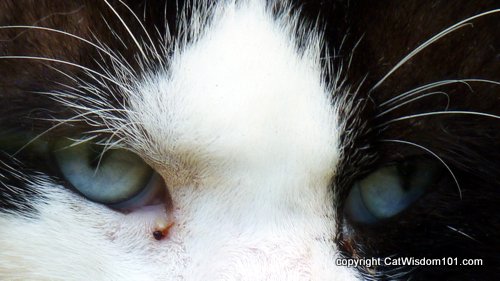Vet 101: Feline Allergies Achoo!
We’re delighted to have feline specialist veterinarian Dr. Letrisa Miller guest post for reader’s Q & A this week. Keep those questions coming. Dr. G will return next week. Send Vet 101 questions to [email protected] with Vet 101 in the subject line.
Question:
Any reading I’ve done seems to suggest that most common cat allergies are to a food protein or grain or additive, or to fleas, things like that. But this past winter Derry’s right eye ran and was goobery constantly — he gets Lysine daily, and has for years, FYI. The vet said because it was clear, not greenish, it wasn’t anything to worry about. I noticed that once the weather got warmer and he was outside more, this has cleared up. I have mostly laminate floor in the house, not carpet, and sweep/dry mop daily, vacuum every couple of days. I thought that he might have a seasonal allergy of some sort. I actually have year-round allergies, and notice that when it’s really cold out, MY left eye waters all the time.
Likewise with Nicki, his most recent blood work came back great, but usually his EOS runs to high normal, or, as it was last fall, slightly above high normal, and I know that’s cell inflammation, can be related to parasites (which he’s been tested for and been negative) and also allergies. I wonder if his next-extended coughing could be related to allergies as well.
So any info on non-food/non-flea feline allergies would be helpful.
Answer:
In figuring out what causes watery eyes in a cat, we need to look at several possibilities: allergies, FHV-1(rhinotracheitis) infection, a scarred tear duct, environmental factors, and behavior. Unfortunately, figuring out the cause of a watery eye can be difficult. The best way to get a definite diagnosis is for your cat to visit a veterinary ophthalmologist, who will have all the latest information and tools needed to unravel the mystery of the watery eye.
That said, here are the most likely suspects.
Allergies. The same things that cause allergies in human beings also cause them in cats. The most common allergens I see—besides food and fleas—are smoke (wood, incense, or cigarette), dust mites, pollen, air fresheners, carpet fresheners, and detergents or fabric softeners. The list of possible allergens is almost unending, however, so figuring out which one(s) your cat is sensitive to can require a lot of detective work. If the allergy symptoms are seen on the skin, skin-based allergy testing might be useful. When we can’t figure out what the allergen is (not an uncommon occurrence), we treat to relieve symptoms. I prefer to give antihistamines such as clemastine fumarate or chlorpheniramine rather than steroids, but if symptoms are severe both may be needed. Many common antihistamines such as diphenhydramine (Benadryl) that work well in dogs do not work well in cats. I prefer clemastine because in cats it is dosed once daily, it is inexpensive, and it works in at least 70 percent of cases. If antihistamines don’t work, then steroids or allergy shots can be tried.
Allergies aren’t the most likely suspect in your cat’s case, however. For allergies to cause discharge from only one eye would be highly unusual (although not impossible, so don’t rule it out).
FHV-1. Eye discharge can also be caused by an infection with feline herpesvirus 1, the common virus that causes rhinotracheitis. However, if the discharge looks like water and has no color to it, the culprit is less likely to be infection (although clear discharge is sometimes seen with these types of infections, so, again, don’t rule it out).
You spoke of giving daily doses of lysine. The veterinary community used to think that reactivation of FHV-1 infection was controlled by giving lysine, but recent research (http://jfm.sagepub.com/content/10/5/510.short) indicates we might have been wrong about that. This is something you might want to discuss with your veterinarian. Many veterinarians still give lysine, as it does seem to decrease symptoms in some cats.
Scarred tear duct. A more common cause of discharge from only one eye is a lack of tear drainage into the tear duct at the inside corner of the lower eyelid. If previous infection has damaged a tear duct, tears will not drain normally and will instead leave the eye by overflowing rather than going down the duct into the nose. (The same symptoms can be seen with allergies or infection if swelling in the eye area blocks off the tear duct. With infection, however, the discharge is usually colored and sticky (mucopurulent) instead of clear.)
Dry air. Dry air in a house during winter could cause irritation of a cat’s eyes, leading them to water or causing the cat to rub them. Occasionally, one eye will feel itchier to the cat, or he might for whatever reason have a preference for rubbing one more than the other. Rubbing the eye then causes histamine release that in turn causes inflammation, more itching, and watering.
Behavior. Cats tend to have a “handedness” preference, and it can lead them to clean one side of their face more than the other. The extra amount of eye rubbing on the favored side may be enough to cause an inflammatory reaction—it doesn’t take much! If your cat is a vigilant face groomer, he might be making the problem worse by rubbing.
Something Else to Consider. In addition to your cat’s eye discharge, you mentioned another symptom that, in combination with your cat’s elevated eosinophil count, concerns me: cough. You are absolutely right that the high eosinophils revealed by your cat’s bloodwork are associated with allergy or parasites. Allergy may be the cause in your cat’s case, but the coughing makes me concerned about a parasite you might not have considered: heartworm (here’s a good short overview about heartworms: http://catalystamewsings.com/2012/04/16/cats-and-heartworms-a-recipe-for-catastrophe/).
If your cat hasn’t been tested for heartworm, he should be. Two tests are available. One detects antibody, and the other detects an antigen (a protein) made by the heartworm. The antibody test is much more sensitive and indicates an exposure to heartworm. The antigen test is not nearly as sensitive. Because it looks only for a protein made by mature female worms, it can miss up to half of mature infections and does not detect infections that don’t reach a mature stage. If a cat has only one worm, which is common, and that one worm is male, the test may not detect it. For these reasons, the best approach is to test first for antibody because infections that don’t reach a stage where an adult heartworm is present can still cause an asthma-like disease called heartworm associated respiratory disease (HARD). The good news is that treatment can help stop the coughing and may prevent chronic asthma from developing.
Coughing should never be ignored in a cat, because it indicates a problem, such as asthma or chronic inflammatory disease, that could become serious if not treated. Coughing should be checked out by a veterinarian who is well-versed in feline lower respiratory disease. A work-up for coughing usually includes chest X-rays and heartworm testing, as well as taking samples of mucus from the lower respiratory tract to look at under a microscope. These tests will give a diagnosis so that proper treatment can be started. If treated early, some cats will be cured. The longer treatment is delayed, however, the more likely it is that any changes in the lungs will be irreversible, requiring treatment over a long period of time. Left untreated, the condition may worsen and can result in diseases such as obesity (no air equals no exercise for a cat) or severe asthma that can result in death.
Runny eyes and coughing are no less annoying to cats than they are to us human beings, so I wish you all the best in solving the mystery of your kitty’s eye trouble and cough.
Letrisa Miller
I hope my patients think I’m a superhero…
I hope my patients think I’m a superhero…
Dr. Miller has a brand new clinic in Manchester, CT.





18 Comments
Nida Rittenberry
Substances you are exposed to only at certain times of the year, such as plant pollens, cause seasonal allergies. Of all the substances that can trigger an allergy, pollen is one of the most widespread. These tiny round or egg-shaped male plant cells hitch rides on air currents to fertilize other plant parts. However, not all pollen causes nasal allergies.*^*..
Have a look at all of the freshest write-up on our own web site <http://www.healthwellnesslab.com
Hairless Cat
Hi Dr. Miller,
Thank you for such complete and detailed information.
That was very helpful and I’m amazed.
=^-^= Hairless Cat Girl =^-^=
CATachresis
Thanks you for that info Dr Miller. Very helpful. My cat has a runny left eye regularly. I have put it down to the weather and/or an allergy. He has coughing fits on occasion which seem to be more to do with hairball horking than anything else. His breathing is regular and not too fast and he doesn’t seem to be in any discomfort. But next time I take him in for his shot I will ask the vet about it, just to be sure.
CATachresis
Oh and many congratulations to Layla and Cat Wisdom 101 for your Petties nomination. Very well deserved xx
Mary Matthews
Thank you for the information. Congrats to Layla, Merlin, Odin, Gris Gris, and Domino on being nominated for best cat blog for the Petties!!
Kathy Thompson
We luv all the specific details that you provide Dr. Miller! I wish we had a feline practitioner in our area too! Cats are so complicated and with their tendancy to mask any sign of illness and injury we have to have real pros when it comes to medical care. Thank you Dr. Miller for being a feline “SUPER HERO”!
Purrs to all Skeeter and Izzy >^@@^<
Dr. Letrisa Miller
Hi Skeeter and Izzy!
Thanks for all of the positive energy!
Bernadette
I don’t know about your patients, but I think you’re a superhero! I love it when my vet answers me with very complete information. It’s why I love my vet, though my cats probably feel otherwise…and I think I just narrowed down a runny eye from last winter along with what my vet had told me at the time. Thanks!
Dr. Letrisa Miller
Thanks so much!
Abby
Excellent information!!!
purrs
>^,,^<
♥Abby♥Boo♥Ping♥Jinx♥Grace♥
Tamago
One of my kitties sometimes has watery (no color) eye. I’ve consulted several vets and they think it’s a minor allergy.
Thank you for very detailed information. It helps me a lot!!
Brian
I sure enjoyed the post and it was full of interesting information!
Fuzzy Tales
Very detailed information, much appreciated. The cat with the sporadic coughing has had this at least since I adopted him at 6 months of age, if not earlier, though it has NOT worsened over the 5+ years he’s been with me. His most recent EOS was normal. I *have* discussed the cough with a couple of vets, who didn’t seem concerned. Granted, there are no feline specialists in our area.
I’ll investigate further. THANK YOU!
Dr. Letrisa Miller
I’m so glad your kitty is doing well and his symptoms aren’t getting any worse. I have avatar of my own that has mild asthma and he does the same thing. As l
Dr. Letrisa Miller
I’m so glad your kitty is doing well and his symptoms aren’t getting any worse. I have avatar of my own that has mild asthma and he does the same thing. As long as mine doesn’t get any worse, I just treat his seasonal allergies with occasional antihistamines. He is even about the same age as your cat. The work up for him showed eosinophils in his airway secretions, but he is heartworm negative (Thank Goodness!).
I wish and your kitties all the best!
Kathryn
Really good information. Cheddar gets scratched up by his brother.
I will have to watch for handedness in our two boys.
Dr. Letrisa Miller
Hi Kathryne,
Recent research has shown that boys cats tend to be right handed, whereas girl cats tend to be lefties. Go figure
Dr. Letrisa Miller
Oops! Sorry I misspelled your name! My bad.